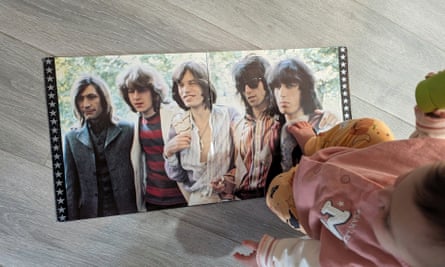
My daughter was born on 4 January, overnight. It wasn’t an easy labour. It lasted more than 24 hours and ended up in an emergency caesarean. When the nurse brought her to me from the surgery room, I thought to myself, “Am I supposed to hold this baby now?” It was the first time I had held a baby. Most of my friends and relatives have kids, many of them were teenagers at that point, but somehow I had managed to never hold a baby. It wasn’t by chance: I’ve never liked them and had always felt afraid of having my own.
I have lived with depression since I was a teenager. It’s hard to explain what suffering from chronic depression is like. Many of us learn how to operate on a daily basis, sitting with sadness in the moments when we are alone, or with our closest family. But there’s a lot of suffering. For me, mornings are the worst. I struggle to find a reason to start my day, and I have to use every tool in my kit to get my mind out of that loop. Most of those tools involve allowing myself to be sad and grumpy for a couple of hours, while I gather strength and my mood starts to change. It’s a tedious daily task that requires time and focus on oneself.
Thanks to these mechanisms I have managed to become a high-functioning depressed person. I never miss a day at work, very few people ever see me sad and I rarely say no to a plan with friends. But for me, having a baby represented a scenario with so many variables out of my control that it always seemed like a terrible idea. I feared that the challenges of parenthood would push me into a hole, the hole that depressed people fight every day to stay out of. I have stayed out of that hole thanks to mechanisms that rely on having time to recover, time to pick myself up from the ground, just time for myself. Exactly the kind of thing that evaporates into thin air when you need to care for a baby.
The story of how I ended up having a baby is long, convoluted and hard to explain. But let’s just say that my partner and I held a staring contest for years. Probably every other person would have given up on me, seeing my solid stance on babies. But my partner did not. In the end, as the years went by, I started having a different view of life. For decades, being depressed has pushed me to relentlessly look for meaning in life, find a purpose and build a legacy based on recognition. But as I passed the 45-year-old mark, I became more jaded. Not in a bad way. I mean that I started to take this legacy thing less seriously. It was always a goal driven by ego and selfishness. But the fact is that … years go by, life goes by and the big moment of glory never arrives.
It was time to rethink my priorities. Having a baby is something that was going to make my partner happy. That ultimately became the reason why I ended up changing my mind. And as a good friend of mine often says: “You actually don’t have to like all babies. You just need to like your own baby.” Ten months have gone by and I am happy to report that I do like my daughter, Olivia.
But over the past 10 months, I have found myself slowly slipping into the feared hole of depression, and my usual safety mechanisms cannot kick in because I have no time to allow them to run their course. Every other day I find out about a new way in which having a baby has changed my life in ways I don’t like. I feel I no longer have control of my own time and I can no longer decide when to do things. I can have a moment of inspiration or productivity, and it goes to waste while I play with my daughter. And as much as I adore Olivia, playing with a baby for hours is just not a lot of fun for me. Still, I am committed to being the best father I can possibly be.
The ways in which caring for a newborn suddenly changes your life can certainly push anyone into depression. And I do want to acknowledge my privilege as a father. The way a mother is affected in the first few months after the birth is simply brutal, but that doesn’t mean fathers can’t also struggle with mental health after the birth of a child. For those of us, mothers or fathers, who already suffer from some sort of chronic depression, things can get really messy in our heads.
Avoiding sadness has been my top priority for decades, which can basically make me act very selfishly at times; but caring for a new life requires constant selflessness. My priorities are having to shift drastically. I have to shape a new life paradigm that permanently shifts the focus of my energy and effort from myself to another human being. That scares me, I have to admit, but people who suffer from chronic depression are survivors, and as long as we manage to stay alive, we can make it through anything.
Olivia is all smiles. As we walk down the street, she smiles at people from her stroller. On the bus, on the train, sitting at a cafe, she is awake, she is curious and above all she smiles. She probably brings more joy to this world than I ever have or will. And maybe that could be the legacy I’ve been searching for all my life.



